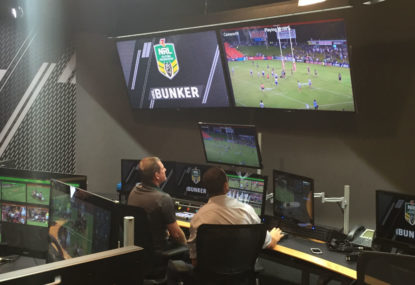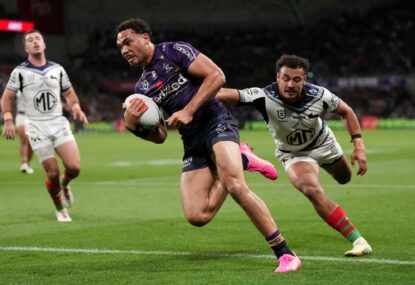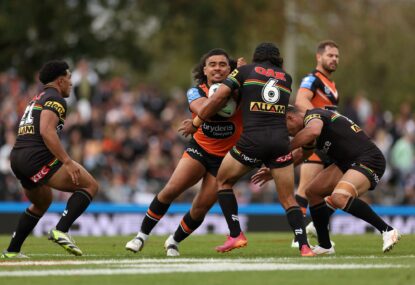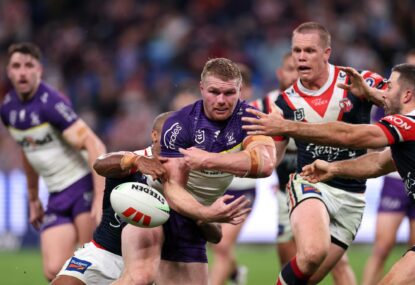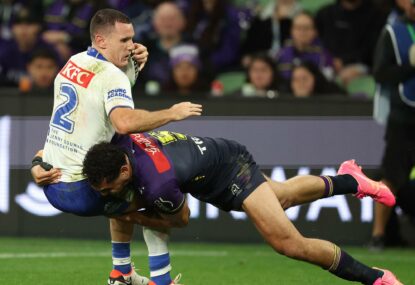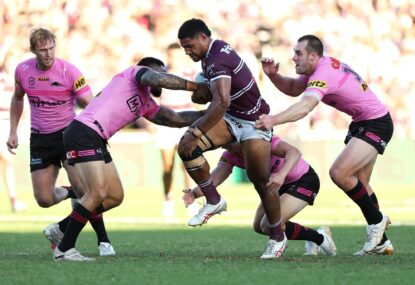For thirteen days in October 1962 the world was a dropped-ball away from nuclear war. United States President Barack Obama is in Cuba this week, the first such visit since Calvin Coolidge, and the Cuban experience offers some advice for the NRL’s referees.
In 1962 the world was at the height of the Cold War. U.S. President John F. Kennedy and Soviet leader Nikita Khrushchev were playing history’s most potentially explosive game of brinksmanship.
The Russians had installed nuclear missiles in Cuba, within range of the US coast 140km away. The American response was to ‘quarantine’ the island and deny access to any ships carrying weapons and materials.
The standoff involved ships and submarines of both nations and neither side wanted to be the first to show weakness. Communication messages were sent between leaders but by the time they were decoded and translated, six hours had elapsed and the next message – often in stronger diplomatic language – had been received.
It was a bit like the scenes at ANZ Stadium on Friday night when a try to Canterbury-Bankstown’s Sam Perrett was sent to the NRL’s Bunker to be reviewed.
The initial verdict from referee Matt Cecchin was a try. The reason the ball passed back by Bulldog Sam Kasiano actually ended up in front of him was because it had touched a Parramatta hand, allowing Perrett to swoop and score.
Or so Cecchin expected.
Once the Bunker officials had a look at the wide angle the ball clearly went forward across the ground. When they then looked at the camera’s view from the far side at ground level it looked far less clear-cut.
The one thing the Bunker could determine positively was that the ball was not touched by a Parramatta player – so how did they reconcile how the pass went forwards, when the on-field referee said it did not?
The video review officials cannot rule on a forward pass. It is outside their remit (when just about everything else is within their role).
Somewhere between the live call of try and the final review decision, the on-field officials had collaborated and come up with a forward pass call from one of the touch judges. The Bunker conveniently leapt on the new information to alter the live call to one of ‘no try’. So their process was maintained.
Who called forward? I don’t know. Referees boss Tony Archer was careful to use the plural ‘touch judges’ twice in his post-match interview, clearing none of the ambiguity.
Matt Cecchin on the ground said to the players that he had failed to hear the call of forward, from his colleagues. One thing I can tell you – if both touch judges are calling out ‘forward’ there is very little chance the referee won’t hear it and an even smaller possibility that he will ignore it.
What we saw on Friday was a lack of communication all round. If the touch judge was sure the pass was forward, he’d have told the ref immediately the moment he went in goal. The referee should have looked at his nearest touch judge at the very least and we would never have got to the live call of try.
From the Bunker’s point of view, they relied on a change of live call that only they and the on-field officials were privy to. Nobody watching at home or at the ground had any idea that the live call had effectively been reversed and therefore shielded the Bunker from having to breach its own protocol when it came to the pass.
Somebody needs to communicate to the viewers that the decision had changed. Bernard Sutton during the review mentioned that there was an on-field forward pass decision, yet this did little to help the viewer understand what was happening.
Communication is the key – Bulldogs captain James Graham had no idea what was going on and neither did anyone else. It’s a clear recipe for heightened tension between the officials and the aggrieved football team.
I checked the NRL Bunker’s official twitter account for an explanation, which they had to date provided for every reviewed decision. Not this time though – there was nothing about it at all. I guess they couldn’t explain it either.
One other notable decision that could have been better communicated was at Mount Smart Stadium on Sunday.
New Zealand forward James Gavet found himself with the ball on the sixth tackle with no option but to kick. So kick he did and sent an admirable chip/bomb from centre-field skywards, coming down about 25 metres away into the arms of Melbourne fullback Cameron Munster.
Through luck or by design – let’s give Gavet some credit – it turned out to be the perfect kick for the situation. Split-second perfect timing saw Gavet crunch Munster as soon as he touched the ground with the ball.
It was a sickening collision. Gavet had launched at Muster’s legs knee-high from the ground and crumpled him into the turf. I thought he was straight to the medicab and off to Auckland’s best knee surgeon to piece together what was left of his ligaments.
Referee Henry Perenara must have thought the same thing. He immediately signaled time off and the Storm trainers attended to Munster.
I saw the first replays and knew the bunker review officials were taking a close look. I was watching on TV but had the volume down so I was keeping a close eye on the officials for their verdict.
Sure the tackle looked ugly, but illegal? No it certainly wasn’t that. If he was hit high, it was a penalty; if he was hit before he got a foot on the ground it was a penalty. This was none of these. This was the most awkward of legal tackles.
So what was the result? Penalty Storm, Gavet on report.
On report for what? I watched carefully for Perenara’s signal to illustrate what the offence was. There was the outstretched arm for the penalty, and then nothing.
A chopping motion to the legs? A low wrapping arms motion? No. Rule number one in refereeing is if you don’t know why you did something then sure as hell make it look like you do.
As it turns out the Match Review Committee did not charge Gavet for the tackle.
Communication was a problem in October 1962, between the world’s superpowers. They understood this very quickly and within a year the Moscow-Washington hotline was established for direct communication between leaders.
The relationship cooled and nuclear war never came as close as it did during that crisis. If the referees can improve their own overall communication they might avoid their annual media-labeled ‘crisis’.





























































































